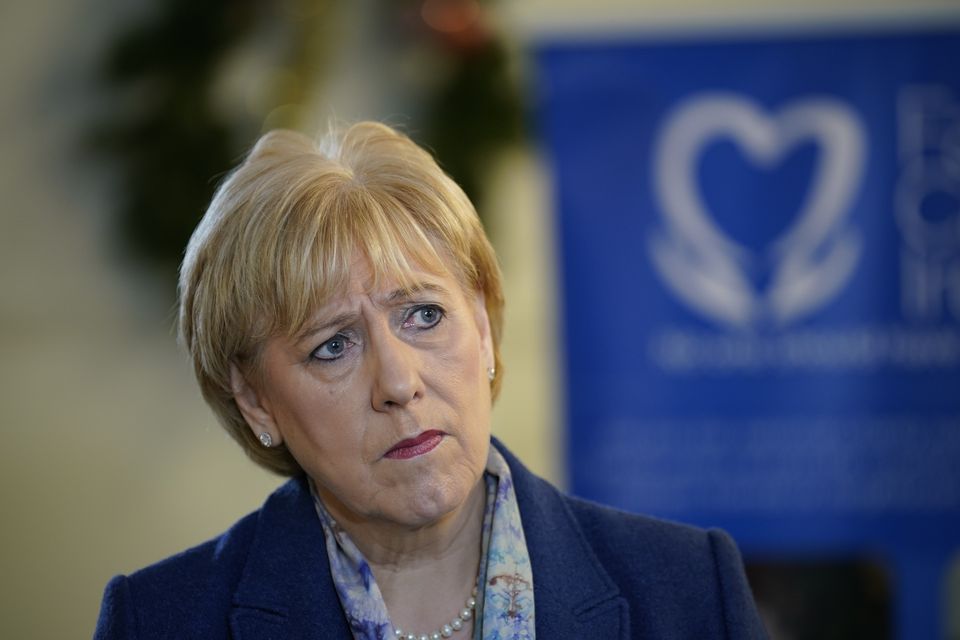Heather Humphreys could cut welfare support for 8,000 Ukrainians to as little as €38.80 a week
But her department declines to be drawn on who will have benefits reduced in three months’ time
Heather Humphreys is working with colleagues on the measures. Photo: PA
More than 8,000 Ukrainian refugees living on pensions and disability welfare payments are at risk of having their supports slashed to below €40 a week.
Thousands of elderly Ukrainian refugees relying on weekly state supports which Social Protection Minister Heather Humphreys plans to cut to €38.80 in less than three months.
Official data shows there are 8,232 Ukrainian refugees receiving a state pension or disability payment.
There are 7,919 Ukrainian over-65s seeking refuge here while their country is under attack from Russia.
Last week, with local and European elections approaching on June 7, Ms Humphreys announced plans to cut welfare for 27,000 Ukrainian refugees, who are in State-provided accommodation, within the next three months.
She has made no public comment on how the plan will work or how refugees will be selected to have their money cut.
The Department of Social Protection declined to say how many of the more than 8,000 Ukrainians in receipt of pensions or disability payments will have their benefits reduced.
The refugees were welcomed to Ireland by Ms Humphreys and her government colleagues two years ago when Russian president Vladimir Putin ordered an invasion of Ukraine in February 2022.
Ukrainians fleeing the war were told they would be entitled to accommodation, full state welfare and medical cards when they arrived here.
The move resulted in more than 100,000 Ukrainians arriving in Ireland. Since March, the refugees were told they would only be entitled to €38.80 a week and provided with three months’ state accommodation.
The decision to cut payments came as the Government struggled to tackle the influx of people to Ireland seeking international protection as the elections approached.
“The Minister for Social Protection will now work together with the Minister for Children, Equality, Disability, Integration and Youth on the operational arrangements to give effect to this change, with an estimated 12-week lead-in time to allow details to be finalised and notice to be provided to the people affected,” her spokesperson said.
A cabinet committee on immigration this week heard how almost 100 people have been prosecuted this year for arriving into Ireland without a passport.
The committee also heard the number of those arriving without travel documentation was down 17pc on the same period last year.
Meanwhile, the number of people who have been deported after failing to secure international protection is up by 50pc.
Taoiseach Simon Harris and ministers were told by Justice Minister Helen McEntee that plans to charter deportation flights would begin before the end of the year.
The Government is planning a major investment in immigration services in an attempt to tackle the record level of asylum-seekers arriving here.
This will include more people working in the International Protection Office (IPO), the International Protection Appeals Tribunal, border management in Dublin Airport and Department of Justice.
The committee was told that if staffing in immigration services was not urgently increased then there could be 40,000 active asylum cases in the country by the end of the year.
At present, there are 28,300 international protection cases being handled by immigration services.
Last year, 13,500 people applied for asylum here – a fourfold increase on what the Government expected. This year, around 1,800 people a month are seeking international protection.
The Government want to enhance the already-accelerated asylum review system operated by the IPO to allow 1,800 determinations on cases to be made every month by the end of this year.
This will increase to 2,200 decisions made on applications by the middle of next year. It is hoped this will result in the number of active cases dropping to 10,500.
The accelerated processing system introduced in 2022 has resulted in a halving of the number of applications from those from countries deemed safe.
It is expected that the number of cases heard by the tribunal will also climb to 1,250 next year.
The number of staff in the IPO is forecast to rise from 490 to 620 next year while the tribunal will get 17 full-time members and 200 part-time ones, along with 175 staff.
The Government is to draft legislation to broaden the criteria to become a decision maker on asylum appeals.
Both agencies are set to get increased office space as part of the ramping up of immigration services. There are also plans to hold appeals online to allow for more capacity in the system.
The number of Department of Justice staff handling deportations is set to rise from 72 to 119 by next year.
Join the Irish Independent WhatsApp channel
Stay up to date with all the latest news










